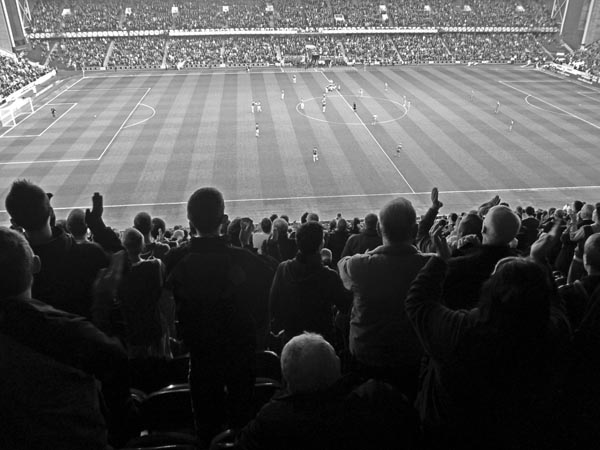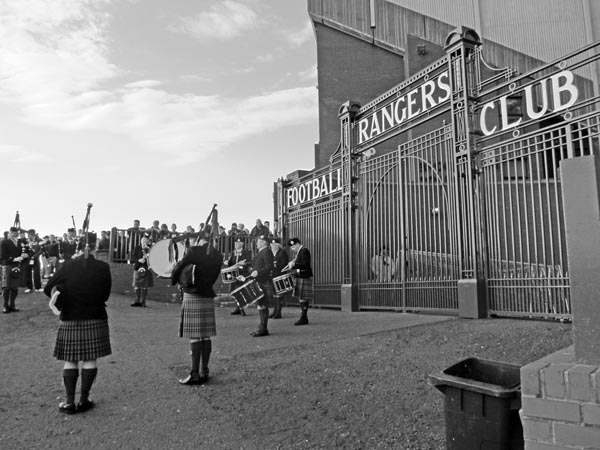Tragedy has followed farce as one of the most prestigious names in Scottish football has fallen victim to capitalist greed...
How capitalism relegated Rangers
WORKERS, SEPT 2012 ISSUE
Professional football has always attracted crooks and frauds. Many clubs and their supporters have suffered, the more so since rewards have grown greatly over the past 20 years. But few events have been as spectacular as the fall of Glasgow Rangers, one of the most prominent and successful clubs in Britain.
The dominance of English sport in the media and the 2012 Olympics have overshadowed the story, so too have other financial crises. In any other year this unfolding story would have made headlines across the country, not just locally in Scotland. The events at Rangers mirror those at other clubs, but few have been so dramatic or on the same scale.

Rangers v Dundee at Ibrox, 2 May 2012. Rangers won 5–0. Now the erstwhile Scottish Premier League club is in Division 3...
Photo: Workers
Rangers FC started this season in Scottish League Division Three against Peterhead, until relatively recently members of the Highland League. They are beset by legal and financial difficulties and are in dispute with the sport’s governing body. Yet at the start of last season they had won three consecutive titles and expected to play in Europe every year. How did this happen?
The company running the club went into administration in February 2012, with potential debts of £134 million. The greatest established debt was £27 million owed to Ticketus, a finance company, and secured on three years’ future ticket sales. This loan was part of deal by Craig Whyte to take over the club from a company run by long-term Rangers chairman Sir David Murray. Rangers were in effect under a double burden.
The forward ticket sales security was a similar arrangement to that which nearly brought down Leeds United a decade ago. Using the club’s own assets to fund a takeover was the method used by the Glazers for their acquisition of Manchester United in 2005.
The greatest threat to the club at the time of the administration was a tax tribunal case for which the potential liability is estimated at £93 million. A verdict from the tribunal is still awaited. The dispute with HM Revenue & Customs is about the alleged use of Employee Benefit Trusts (EBTs) to reduce tax bills of the club, the former owners and its players, over more than ten years. Payments through EBTs are not confined to football; they are used most notably in the financial sector for the same purpose – to avoid deduction of income tax and national insurance.
The BBC Scotland documentary Rangers, The Men Who Sold The Jerseys broadcast in May, revealed that around 100 players, club staff and Murray Group employees benefited from the scheme through payments totalling £47 million, though several of those named deny receiving such untaxed payments.
After the club went into administration, the tragedy turned to farce. Despite much publicity and the obligatory stories of rescue by “lifelong” supporters backed by mysterious overseas businessmen, bidders dropped out one by one. The most often quoted reasons were uncertainty about the size of the debt and a lack of transparency about the dealings that led to the administration.
Last bid
The last bid remaining was from a consortium led by Charles Green which bought Rangers’ assets for £5.5 million. Green was chief executive of Sheffield United from 1996 to 1998. At the end of the period that club’s losses had grown from around £60,000 to £5.9 million, which Green attributed to the large wage bill. Supporters at the time suggested instead that the club had been over-ambitious and poorly managed. While it’s too early to say if history will repeat itself, football has seen many serial offenders who pass from club to club, seeming to repeat their mistakes each time. That may be another burden for Rangers.
In May the Scottish Football Association (SFA) imposed fines and sanctions on the club and the now removed director Craig Whyte. These were in connection with a failure to disclose that in 2000 he had been disqualified as a company director for seven years. The SFA considered that he was not a fit and proper person to be a director and that both he and the club had brought the game into disrepute.
Whyte said none of this was going to affect his life, and shed crocodile tears for the club’s fans. Rangers’ supporters believe that it is unfair to burden the club with the mistakes of the past and to punish it to a greater extent than the perpetrators. They blame Whyte and Murray for effectively destroying the club. Fans ask more pointedly why the SFA is blessed with great hindsight, but can never spot rogues before the damage is done, just like their counterparts in England.
Other factors caused Rangers greater problems than the SFA fines. Punishment for bringing the game into disrepute included a transfer embargo. The club can only sign players under the age of 18 for the next year.
England has a “football creditor” rule under which a club emerging from administration must first pay off debts to other clubs – at the expense of other creditors. No other type of business is allowed to do that and it does not apply in Scotland. Rangers owned money to other clubs in the Scottish Premier League (SPL), and were charged by the SFA with failing to pay gate receipts to Dundee United from a Scottish Cup match. That had consequences later on, when Rangers needed support from those clubs.

Photo: Workers
Green’s plan was apparently to take Rangers out of administration by coming to an agreement with creditors, paving the way for a return to the SPL. Players and staff agreed wage cuts to enable last season's fixtures to be completed. Such gestures were not going to be enough to satisfy their creditors and HMRC. The old company lost its SFA and SPL registrations and will eventually go into liquidation. A new company was set up and had to apply afresh to be admitted to the league.
There was no way out for new Rangers. There were disputes with players who rejected the claim by the new club that their registrations transferred over from the old company. A majority of SPL clubs rejected the application for re-election. The Scottish League only permitted Rangers to join at the bottom, playing against clubs whose regular attendance is lower than in the English Conference. The whole of Scottish professional football is likely to lose sponsorship and other income as a result of Rangers’ demotion.
There is no certainty that Rangers’ own troubles are over. In August the SFA set up a commission to consider if the EBT payments by Rangers broke SFA rules. As well as a massive tax bill, there could be further sanctions against the club for breach of SFA rules. These require that all payments to players must be declared; it’s said that those made into EBTs were not.
Supporter-owned clubs
Supporters elsewhere have in several cases set up supporter-owned clubs after their club has been hijacked. The most notable and successful of these is AFC Wimbledon, which started from scratch in 2002 and is now in the Football League. In other cases fans have raised money to “rescue” a club, but have only succeeded in giving it to those who created the problem, with no control.
This tale has many parallels with the wider economic crisis. Supporters believe that a club is a social and cultural institution, and that it only exists because of their support and patronage. Capitalists believe that if they own the shares of the limited company currently running the club, it’s theirs to do with as they will. Both are right, and in the end irreconcilable. ■